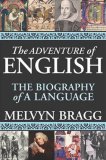Summary | Excerpt | Reviews | Beyond the Book | Readalikes | Genres & Themes | Author Bio

Critics' Opinion:
Readers' Opinion:
First Published:
Sep 2004, 336 pages
Paperback:
Sep 2006, 336 pages
 Book Reviewed by:
Book Reviewed by:
BookBrowse Review Team
Buy This Book
Similarly, many Viking family names remain today, again much more emphatically in the north. The Danish way of making a name was to add "-son" to the name of the father. If you look in the local papers inside the old Danelaw you find these sons everywhere. At my own school there were Johnsons, Pattisons, Robsons, Harrisons, Rawlinsons, Watsons, Nicholsons, Gibsons, Dickinsons, Hudsons, Hewitsons, Stevensons. And it is still true that despite the centuries of people moving around these comparatively small islands, there are still markedly more shop names, "Harrison," "Johnson," "Wilkinson," more sons, than in any other part of the country.
So they marked their places of arrival and they brought their names. The number of their words which entered into general use was not as many as the strength of the invasion might have promised. But as it were to compensate for that, many of them have become key words. For instance, "they," "their" and "them" slowly replaced earlier forms (though they did not enter the language of London until the fifteenth century). Early loan words include "score," and "steersman" is modelled on an Old Norse word, but they could also spread into the common tongue with "get" and "both" and "same," "gap," "take," "want," "weak" and "dirt." What is impressive is its ordinariness. Other Norse loan words include "birth," "cake," "call," "dregs," "egg," "freckle," "guess," "happy," "law," "leg," "ransack," "scare," "sister," "skill," "smile," "thrift" and "trust."The "sk" sound is a characteristic of Old Norse and English borrowed words like "score," "skin" and "sky." Other words from Old Norse include "knife," "hit," "husband," "root" and "wrong."
So it could be argued that although they were not numerous these words became part of the soil of the language. Perhaps English was at a stage where it would only admit words which could help it describe its own world, words which could bed in without disturbing the existing word-hoard. This can best be seen by the early pairings. (In all cases the Old Norse is given first.) "Hale" was used as well as "whole." In Norse you were "ill," in Old English you were "sick." Old Norse "skill" settled down alongside "craft," "skin" joined "hide." (Some of these words appear widely only after the Conquest.) Although they most likely began their life in the common language pointing to the same thing or the same condition, they held a slightly different meaning which was used, as time went on, to make finer distinctions. This twinning, which later split and went rather different ways, became one of the most fertile and inventive characteristics of English. We can see it clearly at work in a modest but enduring number of word-pairings, here in pre- Norman times.
And along the line of the Danelaw, in the trading outposts, the great grammar shift began to take place. This is the only case in our history in which the whole structure of the language changes.
In Old English, sense is carried by inflection— it worked in the same way that Latin did. The essential thing about it was that word order was much freer than it is today. On the whole, Old English tended already to use the order that we do now: subject, verb, object is the most common. But that wasn't a hard and fast rule. So if an Angle wanted to say "the dogs killed the cat," he'd have to have the accusative form of cat, and the verb in the right form, to make his meaning clear, so that the message pointed to the death of the cat and not the dogs. Their sentences came not through word order but by tacking on endings to words, like articles and pronouns and nouns.When English came into contact with the not wholly dissimilar Danish language, a lot of the in- flected endings began to lose their distinctive nature. The new grammatical meld tended to happen in the borderland market towns; words followed the trade. Clarity for commerce may have been the chief driving force.
From Chapter 2 of The Adventure of English by Melvyn Bragg, pages 16-28. Copyright Melvyn Bragg 2003. All rights reserved. Reproduced by permission of the publisher, Arcade Publishing Inc. No part of this book may be reproduced without written permission from the publisher.





The Funeral Cryer by Wenyan Lu
Debut novelist Wenyan Lu brings us this witty yet profound story about one woman's midlife reawakening in contemporary rural China.
Your guide toexceptional books
BookBrowse seeks out and recommends the best in contemporary fiction and nonfiction—books that not only engage and entertain but also deepen our understanding of ourselves and the world around us.